Hagazussa: A Heathen's Curse (2017)
Directed by: Lukas Feigelfeld
Written by: Lukas Feigelfeld
Starring: Aleksandra Cwen, Celina Peter, Claudia Martini, Tanja Petrovsky
AUSTRIA/GERMANY
AVAILABLE ON BLU-RAY
RUNNING TIME: 103 mins
REVIEWED BY: Dr Lenera
In a small Alpine village during the middle ages, single mother Martha lives separate from the others and is thought of with great suspicion. Eventually she catches some horrible disease that causes both insanity and lumps on the body to form, and dies right in front of her poor daughter Albrun. Two decades or so later and Albrun is also a single mother who lives separate from the others, and is also thought of with great suspicion. She’s befriended by Swinda, but can she escape her dark family heritage…
Before I do a review, I sometimes glance at the IMDB ratings and the top few lines of a few reviews on there, just to get an idea of what the general opinion of a film is, as well as to sometimes decide whether I actually want to review it or not if it’s something I’ve never heard of. Hagazussa: A Heathen’s Curse sure seems to have divided folk, with the majority of the star ratings out of ten either being extremely high [nine or ten] or extremely low [one or two]. Of course this piqued my interest greatly, and a look at a line comparing this film to my favourite movie of last year [though once I’d watched it it didn’t seem that similar to me] was all I needed to agree to review it. The title translates as Witch, and indeed this film has quite a few similarities to Robert Eggers’ The Witch from 2015, so much so that it almost seems like a deliberately crafted companion piece at times, though it goes more and more down its own path, and is to me slightly better. The Witch felt highly authentic, but didn’t succeed in getting me to ‘feel’ very much. That’s not something I can say that about writer/director/co-writer Lukas Feigelfeld’s debut feature, though I’m not sure that I was always happy about what I felt. His look at medieval superstition, trauma, madness, and the impossibility of escaping your lineage, which continually plays out alongside trees, mountains and the sky which all seem to play their own part in telling this very tragic tale, also does a very good job of not letting you know what you’re supposed to think. Towards the end, it leaves more and more up for interpretation, but even before Feigelfeld seems to take a delight in not explaining things to us which he could have easily done with just a few words; his film feels like one where all the explanatory bits have been removed. For example there’s a scene where the local priest gives Albrun the skull of her mother with two unexplained roses painted on it. I have my theory concerning the roses, though it may be different to yours.
You’ve probably realised by now that this is very much up the arty end of the scale. Though I’m not a huge fan of the state of horror as a whole right now, something which is dominated by remakes and jump scares, the art house side has been doing very well of late, and one of the things I love is how a great many fans of the genre are willing to check out such offerings as well as watch stuff from decades ago, both of these being things that sadly seem to be diminishing regarding many other types of films. I was wickedly tempted to type, below this one’s title, “the film for those who thought The Witch was too fast paced”, but those readers who are not familiar with my reviews would probably think that I meant that as a bad thing. It does indeed move at a very contemplative pace, and so much of it consists of lengthy shots of its heroine [or should that be anti-heroine?] looking at something right by the camera or directly into it as we are forced to study her face and attempt to work out precisely what’s going on in there [which is a hell of a lot], or shot from far away, positioned in the middle of the frame surrounded by grass or trees, reminding us that, however horrible her ordeal might be, however dramatic the things we witness are, nature will remain pretty much the same; ever present, observing, perhaps even silently commenting. There’s not even much dialogue, and what there is tends to be spoken by people other than Albrun. But, as long as you’re in the mood to watch something very studied, quite a powerful spell [okay, maybe it is like my favourite film of last year after all] is cast right away and is maintained despite some slight slacking off around the middle, things tending to feel unsettling throughout, occasionally bursting out in some really queasy, even transgressive, moments, even if conventional shock tactics are usually ignored.
A synthesised thudding noise while the opening titles come up on a black screen gets you into the right vibe, after which we slowly, very slowly, zoom away from a snowy landscape to eventually reveal someone pulling a sled beneath us. After some lower angle shots of someone else approaching, the camera resumes its bird’s eye position and zooms back even more to reveal four tiny figures surrounding the sled. Feigelfeld likes to do this a lot; take a hell of a long time to give us the full picture, and I love it, though to be fair some may lose their patience. We meet mother and daughter, both somewhat apart from everyone else, and then we get a fairly spooky scene as an old man warns them about Perchato [sort of a far nastier Santa Claus] as it’s Twelth Night, and they move through part of the forest to their home, yet nothing is actually happening, all that we here being the sound of the wind! Feigelfeld has a great ability to do this kind of thing, and also constantly suggests, with brilliant subtlety, the presence of the supernatural even though we don’t really see any evidence of such until right at the end. A scene in the house is telling for two reasons; only young Albrun is seen eating, as if Martha’s too poor to feed herself, and when villagers come to bang on the door, call them witches, and say they should be burned, her motioning of Albrun to hide under the table and the swiftness with which Albrun does this, tells us that this happens often. The next day, Martha collapses while collecting wood and becomes bed-ridden; she then grows lumps on her side and begins to lose control. One’s sympathies are with her, seeing as she’s been persecuted and may possibly be going insane because of that, until she virtually assaults Albrun in bed when Albrun’s had her first period in a truly uncomfortable moment. The effectiveness of all this is enhanced by little Celina Peters’ very believable acting, and the makeup on Claudia Martini’s face which gives her a skull-like complexion.
The film is divided into four chapters, and the beginning of the second, entitled ‘Horns’, has the only bit of humour when the camera gazes at the bright blue sky and the horns of goats keep entering, then disappearing, from the bottom of the frame. They belong to a grown Albrun who’s now mother to an infant girl. The identity of the father remains a mystery, perhaps unsatisfyingly so, though I detect a hint or two that she was raped. Albrun gets some sexual fulfillment from her goats anyway, a really, really strange moment that will leave you pondering for ages as to its point. Albrun is ostracised just like her mother was. Even the priest, who lives in an ossuary – all those walls being made from skulls and other bones making for a forbidding setting for this scene – is cold and goes on about sacrilege and temptation. Swinda seems to be nice, but the ominous threat of something bad happening is always lurking. When it comes, it’s still a nasty surprise, after which we cut to perhaps the most pictorial, yet also the most painful, of all those lengthy shots of Albrun far away from the camera, she trying to come to terms with what has just happened much like we are. Feigelfeld has now set up expectations as to where things are headed from here, but it’s expectations that aren’t fulfilled, so we don’t get to enjoy the sight of Albrun avenging herself on her persecutors much. Instead, we’re given a more interior journey, which has probably disappointed some; yet, when we’ve seen the same tropes rehashed over and over again, isn’t it good to be surprised with something different for a change? Albrun being under the influence of magic mushrooms for some of the time seems unnecessary, it lessens the idea of her developing mania, but you’ve got to admire the guts of Albrun in not just having two particularly horrid events taking place, but to show the first one beautifully and abstractly, us being underwater and seeing blood invade the river and take over its flora like painting oil.
It’s sometimes hinted at that both women are witches, though we see nothing magical except for the final scene, a scene I’d love to know Feigelfeld’s reason for putting in, because it slightly weakens the themes with which his film deals with. What Arburn and Martha certainly are is mentally ill, and we’re reminded of the fact that the mentally ill can often be created or have their condition made far worse by the society within which they live. There are also seems to be an element of sexual disgust present here and there, so much so that one can almost take the film as a parable of the first huge outbreak of syphilis which took place in the 15th century, affecting most of the countries of Europe, and the way that its association with sex, especially promiscuity and prostitution, made it an object of fear and revulsion and almost a taboo subject. Of course many films have looked at the way women who were “different”, who displayed some sexuality, who had children out of wedlock, who tried to live their life with some freedom, were often branded witches by the Christian patriarchal rule of Europe which replaced a much less misogynist pagan one, but few focus principally on the accused. Yet surprisingly, given current filmdom’s obsession with the subject, the feminist subtext isn’t thrown in your face and no real emancipation or liberation goes on, which makes the whole thing even more hard-hitting. And, on occasion, we even have Albrun being depicted pretty much as weird as she’s thought to be. So much is ambiguous here.
Hagazussa doesn’t really aim for a rational narrative, while it’s often left up in the air as to why some people do things or even who they are in relation to others. The culture in which it takes place remains alien; we never really get to know it, and thereby end up understanding so little. Feigelfeld makes so many brave choices which most other filmmakers wouldn’t make, some of which may annoy, but which at least make the result something of a one of a kind. Saying that, there seem to be affinities with Possession [the 1982 film of that title] and Antichrist here and there, while Feigelfeld’s lingering style bears the influence of Andrei Tarkovsky and David Lynch. It does greatly stretch out a script that probably only consisted of thirty pages, but the sense of dread remains. The doom-laden atmosphere is enhanced for the most part by the droning music score by experimental ambient Greek duo MMMD. The way the long slow notes are often heard extremely quietly, so you can only barely hear them, is very effective, though after a while I tired of the same four or five chords being passed around over and over again. Aleksandra Cwen really had quite a difficult job as Albrun, though there are occasions where she comes across as a bit too inscrutable. But then I guess she’s just aiding the job being attempted by the screenplay and the filming, which seems to be to take us partly inside the mind of a very disturbed person and to feel her isolation, paranoia and guilt, yet still maintain some distance; for example we get some mildly trippy visuals but they don’t take over, us still being given a sense of some objectivity – well, unless you take the viewpoint that our eyes could be deceiving us. Hagazussa is depressing, frustrating, even irritating – and sometimes kind of brilliant.
Hagazussa was shot on a very low budget, but you wouldn’t know it apart from some minor flaws in the blacks during a few scenes. Colour and even density fluctuation were no doubt intended by cinematographer Mariel Baqueiro. The mostly muted hue schemes still contain a huge amount of detail and the outdoor greenery nicely pops out at times for a contrast. Music Box Films released this just over a year ago on Region ‘A’. Arrow, as usual, have added some extra value, namely a full audio commentary, another of Feigelfeld’s short films in addition to the one on the Music Box, and, only on this Limited Edition, a CD of the soundtrack.
The always interesting Kat Ellinger’s audio commentary is slightly more scene specific than normal, even though she typically spends much time placing the film in context. But we hear about some of the filming including Cwen training for two years to get into her character, how the film looks at sexuality, learn some historical background, and much else. She clearly really likes this film and it shows in her best talk track yet. For the commentary by Feigelfeld, he only talks over slightly more than half an hour of the film; the opening, the bed scene, and the last twenty minutes consisting of the short final chapter and the scene immediately proceeding it. He’s so erudite as he talks us through what he was trying to achieve it’s a shame that he doesn’t talk over the rest of the film. We learn that Cwen nearly fainted running up a slope, have the significance of the magic mushrooms explained, and have symbolism described.
Next up are the short films by Feigelfeld, and they’re quite different from each other, though Interferenz certainly has similarities with Hagazussa: the long lasting static shots, the vagueness of plot details, nature playing a major part. A man is on an island working on some drill which is damaged and kills some of the other workers. He has a lover there, but keeps having slow motion dreams of flashbacks of his wife in some idyllic green paradise. However, he needs to destroy the drill before it somehow kills everyone else. It’s puzzling, extremely well made, and full of what seem like vague allusions to films as diverse as Shutter Island and A Fistful Of Dynamite. By contrast, Beton takes the form of video camera footage being shot by two bored teenagers who have no money, and who therefore opt for stealing and worse. There’s a visit to a rave, alcohol and drug taking, some vague class commentary and a very telegraphed tragic ending. It feels a tad aimless at times, but is still absorbing. The two young performers in it are quite natural. Both of these are most definitely worth your time. Then we have a deleted scene which takes place quite near the end and features a reappearance by the old man who turned up near the start. It’s nice, but I can understand Feigelfeld’s reason for removing it. And finally an okay MMMD music video for one of the tracks in the film, inter-cutting movie clips with two of the band members playing their instruments clad in robes before a great house.
The Limited Edition also comes with a CD of the score by MMMD. While I criticised it a little in my review of the movie, I do admit that as a listening experience it most definitely casts its own spell, the sounds burrowing their way into the subconscious if you’re in the right mind. Considering the sameyness of much of the music though, it might have been better to join some of the tracks together.
Arrow have a knack for picking particularly interesting new genre movies to release. Hagazussa: A Heathen’s Curse loves to linger, and will then linger in your mind for ages. Highly Recommended.
2-DISC DIRECTOR APPROVED LIMITED EDITION CONTENTS:
*Limited Edition Blu-ray and Soundtrack CD collection [2000 copies]
*High Definition Blu-ray™ (1080p) presentation
*Original DTS-HD Master Audio 5.1 surround and LPCM Stereo 2.0 Audio
*Optional English subtitles
*Reversible sleeve featuring artwork by Adrian Baxter
*Booklet featuring new writing on the film by Kier-La Janisse and press book extracts, illustrated with original stills
*Double-sided fold-out poster featuring two artworks
*Slipcover featuring original artwork by Adrian Baxter
DISC 1 [BLU-RAY] – HAGAZUSSA
*Audio commentary by critic and author Kat Ellinger
*Select scene audio commentary by writer-director Lukas Feigelfeld [35 mins]
*Interferenz [2013, 48 mins,and Beton [Concrete] [2013, 55 mins], two short films by Lukas Feigelfeld
*Deleted scene with optional commentary by Feigelfeld [3 mins]
*MMMD Music Video [6 min]
*Theatrical trailer
*Teaser
DISC 2 [CD] – HAGAZUSSA SOUNDTRACK [Limited Edition Exclusive]
*CD containing the complete Hagazussa Soundtrack by MMMD

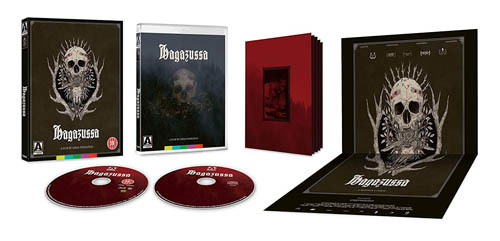
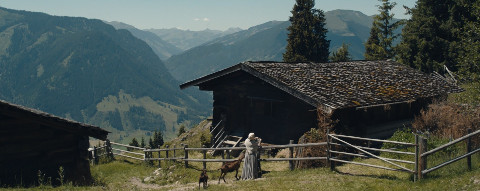
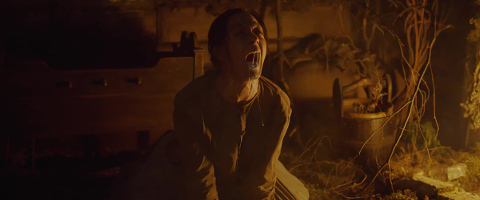



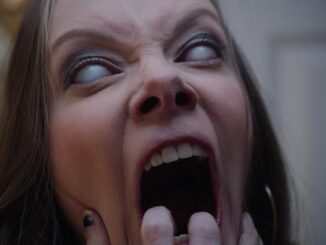
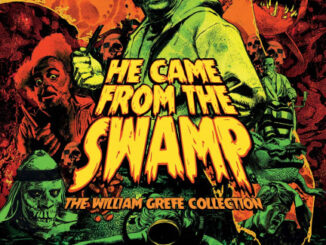
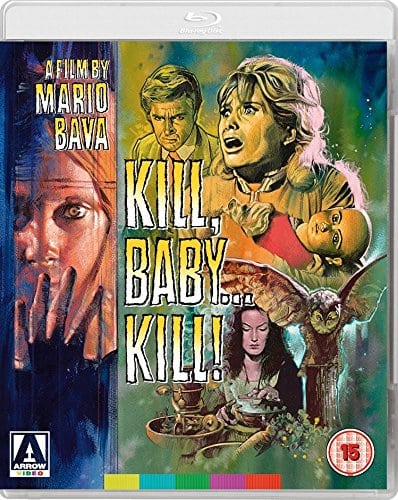
Be the first to comment